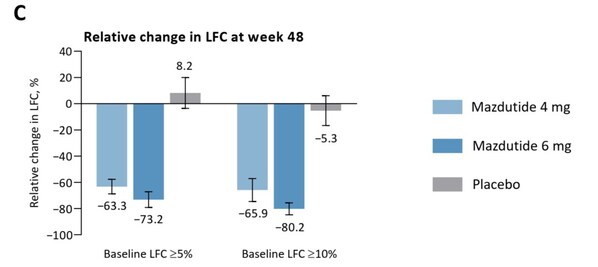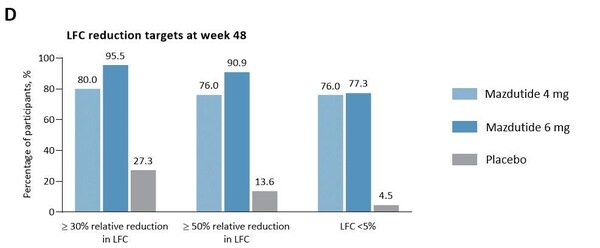SAN FRANCISCO and SUZHOU, China, June 25, 2024 /PRNewswire/ — Innovent Biologics, Inc. (Innovent) (HKEX: 01801), a world-class biopharmaceutical company that develops, manufactures and commercializes high-quality medicines for the treatment of oncology, autoimmune, cardiovascular and metabolic, ophthalmology and other major diseases, reports the results of liver fat content from the Phase 3 study of mazdutide in Chinese adults with overweight or obesity (GLORY-1) at the ADA scientific sessions 2024.
Mazdutide (Innovent R&D code: IBI362) is a glucagon-like peptide-1 receptor (GLP-1R) and glucagon receptor (GCGR) dual agonist. By activating GLP-1R, it reduces appetite and delays gastric emptying, thereby achieving weight loss. At the same time, through activation of GCGR, it increases energy expenditure, enhances fatty acid oxidation and lipolysis, and reduces liver fat.
Professor Linong Ji, the leading principal investigator of the study, Peking University People’s Hospital, stated, “Metabolic dysfunction-associated fatty liver disease (MAFLD) is one of the most common chronic liver diseases in the world and the most common comorbidity in overweight and obese people in China. Metabolic dysfunction-associated fatty liver disease (MASH) and MAFLD are significant unmet clinical needs, making them hot spots for innovative drug development in the field of metabolism. In recent years, the potential of GLP-1 drugs in improving MAFLD and MASH has begun to be realized. Yet, due to the core role of glucagon in liver fat metabolism, multi-target agonists that simultaneously activate GCGR appear even more promising in the treatment of MAFLD and MASH. In the Phase 3 weight loss trial of mazdutide, we observed a significant decrease in liver fat content; the number was greater than that of GLP-1 receptor mono-agonists and other dual-target agonists as reported in other studies. This result supports that simultaneous activation of GCGR based on GLP-1R agonists may bring greater liver benefits. I look forward to further exploration of mazdutide in the treatment of MAFLD and MASH.”
In GLORY-1 trial (ClinicalTrial.gov:NCT05607680), 610 Chinese adults with BMI ≥28 kg/m2, or ≥24 kg/m2 and at least one weight-related comorbidity were randomized in a 1:1:1 ratio to receive once-weekly, subcutaneous mazdutide 4 mg, 6 mg or placebo for 48 weeks.
A total of 92 participants had an MRI scan and a liver fat content (LFC) measurement by MRI-PDFF at baseline, among whom 69 participants (25 with mazdutide 4 mg, 22 with mazdutide 6 mg and 22 with placebo) had LFC ≥5% at baseline and week 48 LFC assessment, and were included in this exploratory analysis.
Mazdutide treatment led to robust reduction in LFC and improved liver function
- In 69 participants with baseline LFC ≥5% and week 48 LFC assessment, treatment with mazdutide for 48 weeks dose-dependently reduced LFC, substantially greater than placebo (mean relative change from baseline: −63.3% for mazdutide 4 mg; −73.2% for mazdutide 6 mg; 8.2% for placebo)
- In participants with baseline LFC ≥10%, treatment with mazdutide 6 mg led to mean relative reduction of 80.2% in LFC at week 48.
- Compared with placebo, substantially more participants with mazdutide achieved ≥30% relative reduction in LFC, ≥50% relative reduction in LFC and normalization of LFC (<5%) at week 48. Of note, 95.5% of participants with mazdutide 6 mg achieved ≥30% relative reduction in LFC at week 48, and 77.3% of participants with mazdutide 6mg achieved LFC<5% at week 48.
- Marked reductions in body weight, waist circumference, blood pressure, transaminase and lipids were observed in participants treated with mazdutide.
Dr. Lei Qian, Vice President of Clinical Development of Innovent, stated, “Improvement of liver fat metabolism is one of the important advantages of mazdutide as dual against of GLP-1R/GCGR. Consistent with observed positive signs of liver fat reduction in the Phase 2 study of mazdutide, the results of the GLORY-1 study further support that mazdutide may promote liver fat metabolism through the stimulation of GCGR and significantly reduce liver fat content. We believe mazdutide’s exceptional performance in reducing intrahepatic fat shows its promising potential, warranting further exploration of the drug’s clinical value in MAFLD and MASH diseases. We hope to provide improved treatment options for the large population affected by metabolic-related fatty liver disease.”
About Obesity
As a chronic disease with a complex etiology, obesity is a leading risk factor of type 2 diabetes, fatty liver, cardiovascular and cerebrovascular diseases, kidney diseases, joint diseases, sleep apnea and various cancers. With economic development and lifestyle changes, the number of obese populations in China has jumped to the highest in the world[i]. The incidence and mortality of cardiovascular disease, type 2 diabetes and certain tumors are also higher in populations with severe obesity. Deaths caused by overweight and obesity accounted for 11.1% of deaths related to chronic non-communicable diseases in 2019, a significant increase from 5.7% in 1990[ii]. Overweight and obesity have become serious health problems. Lifestyle intervention is a basic treatment option for patients with overweight or obesity. However, a considerable percentage of patients fail to achieve their desired weight loss goal through merely lifestyle intervention and may require pharmacological intervention. Traditional pharmacological therapies in China have limited efficacy and pose multiple safety concerns, underscoring the unmet clinical need for more effective and safe treatments for the Chinese obese population.
About Mazdutide (IBI362)
Innovent entered into an exclusive license agreement with Eli Lilly and Company (Lilly) for the development and potential commercialization of OXM3 (also known as mazdutide), a GLP-1R and GCGR dual agonist, in China. As a mammalian oxyntomodulin (OXM) analogue, with the effects of GLP-1 receptor agonists to promote insulin secretion, lowering blood glucose and reducing body weight, mazdutide may also increase energy expenditure and improve hepatic fat metabolism through the activation of glucagon receptor. Mazdutide has demonstrated robust weight loss and glucose-lowering effects in clinical studies as well as improvements in multiple cardio-metabolic indicators including reducing waist circumference, blood lipids, blood pressure, blood uric acid, liver enzymes, liver fat content and improved insulin sensitivity. Currently, five Phase 3 studies of mazdutide in Chinese adults with overweight or obesity (GLORY-1 and GLORY-2) and type 2 diabetic (DREAMS-1, DREAMS-2 and DREAMS-3) subjects are underway, where GLORY-1 and DREAMS-2 studies have met the primary and all key secondary endpoints.
In February 2024, the first NDA of mazdutide was accepted by the CDE of China’s NMPA for chronic weight management in adults with obesity or overweight.
About Innovent
Innovent is a leading biopharmaceutical company founded in 2011 with the mission to empower patients worldwide with affordable, high-quality biopharmaceuticals. The company discovers, develops, manufactures and commercializes innovative medicines that target some of the most intractable diseases. Its pioneering therapies treat cancer, cardiovascular and metabolic, autoimmune and eye diseases. Innovent has launched 10 products in the market. It has 4 new drug applications under regulatory review, 4 assets in Phase III or pivotal clinical trials and 18 more molecules in early clinical stage. Innovent partners with over 30 global healthcare companies, including Eli Lilly, Sanofi, Incyte, Adimab, LG Chem and MD Anderson Cancer Center.
Guided by the motto, “Start with Integrity, Succeed through Action,” Innovent maintains the highest standard of industry practices and works collaboratively to advance the biopharmaceutical industry so that first-rate pharmaceutical drugs can become widely accessible. For more information, visit www.innoventbio.com, or follow Innovent on Facebook and LinkedIn.
Forward-looking statement
This news release may contain certain forward-looking statements that are, by their nature, participant to significant risks and uncertainties. The words “anticipate”, “believe”, “estimate”, “expect”, “intend” and similar expressions, as they relate to Innovent Biologics (“Innovent”), are intended to identify certain of such forward-looking statements. The Company does not intend to update these forward-looking statements regularly.
These forward-looking statements are based on the existing beliefs, assumptions, expectations, estimates, projections and understandings of the management of the Company with respect to future events at the time these statements are made. These statements are not a guarantee of future developments and are participant to risks, uncertainties and other factors, some of which are beyond the Company’s control and are difficult to predict. Consequently, actual results may differ materially from information contained in the forward-looking statements as a result of future changes or developments in our business, the Company’s competitive environment and political, economic, legal and social conditions.
The Company, the Directors and the employees of the Company assume (a) no obligation to correct or update the forward-looking statements contained in this site; and (b) no liability in the event that any of the forward-looking statements does not materialise or turn out to be incorrect.
References
|
[i] Pan XF, Wang L, Pan A. Epidemiology and determinants of obesity in China. Lancet Diabetes Endocrinol 2021; 9: 373–92. |
|
[ii] Institute for Health Metrics and Evaluation. Global Health Data Exchange. GBD results tool. http://ghdx.healthdata.org/gbd-resultstool (accessed Jan 10, 2021). |

